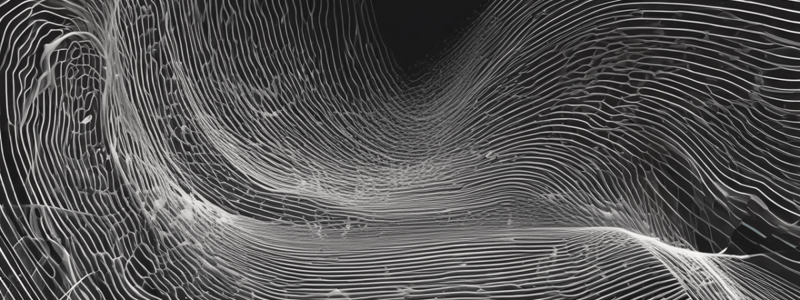Podcast
Questions and Answers
What is the symbol used to represent the period of a sound wave?
What is the symbol used to represent the period of a sound wave?
- f
- T (correct)
- c
- λ
If one cycle of a sound wave takes 0.2 μs to occur, what is the frequency of the wave?
If one cycle of a sound wave takes 0.2 μs to occur, what is the frequency of the wave?
- 2.5 MHz
- 20 MHz
- 10 MHz
- 5 MHz (correct)
What is the unit of measurement for wavelength?
What is the unit of measurement for wavelength?
- millimeters (correct)
- hertz
- seconds
- meters per second
Can the wavelength of a sound wave be controlled by the sonographer?
Can the wavelength of a sound wave be controlled by the sonographer?
What is the formula to calculate wavelength?
What is the formula to calculate wavelength?
What is the effect of shorter-wavelength sound waves on the diagnostic quality of ultrasound images?
What is the effect of shorter-wavelength sound waves on the diagnostic quality of ultrasound images?
What is the propagation speed of a sound wave dependent on?
What is the propagation speed of a sound wave dependent on?
What is the speed of sound wave propagation in a specific medium?
What is the speed of sound wave propagation in a specific medium?
What is the primary effect of a decrease in area on the intensity of an ultrasound pulse?
What is the primary effect of a decrease in area on the intensity of an ultrasound pulse?
What is the term used to describe the weakening of an ultrasound pulse as it travels through a medium?
What is the term used to describe the weakening of an ultrasound pulse as it travels through a medium?
What is the maximum amount of variation that occurs in an acoustic variable, such as pressure, in an ultrasound wave?
What is the maximum amount of variation that occurs in an acoustic variable, such as pressure, in an ultrasound wave?
What is the primary purpose of the dead time in a pulsed ultrasound wave?
What is the primary purpose of the dead time in a pulsed ultrasound wave?
What is the term used to describe the range of frequencies emitted by a pulsed ultrasound transducer?
What is the term used to describe the range of frequencies emitted by a pulsed ultrasound transducer?
What type of ultrasound diagnostic images are generated by pulsed wave transducers?
What type of ultrasound diagnostic images are generated by pulsed wave transducers?
What is the primary application of continuous wave ultrasound?
What is the primary application of continuous wave ultrasound?
What is a limitation of continuous wave ultrasound?
What is a limitation of continuous wave ultrasound?
What is the effect on PRF when the imaging depth is increased?
What is the effect on PRF when the imaging depth is increased?
What is the relationship between PRP and PRF?
What is the relationship between PRP and PRF?
What is the typical unit of measurement for PRP?
What is the typical unit of measurement for PRP?
What happens to the pulse-repetition period when PRF increases?
What happens to the pulse-repetition period when PRF increases?
What is the formula to calculate pulse duration?
What is the formula to calculate pulse duration?
What is the effect on pulse duration if the number of cycles in a pulse is decreased?
What is the effect on pulse duration if the number of cycles in a pulse is decreased?
What is the duty factor in terms of PRP?
What is the duty factor in terms of PRP?
What is the typical range of PRP values in clinical imaging?
What is the typical range of PRP values in clinical imaging?
What is the primary purpose of the listening time in pulsed ultrasound?
What is the primary purpose of the listening time in pulsed ultrasound?
What is the unit of measurement for pulse duration in the calculation of duty factor?
What is the unit of measurement for pulse duration in the calculation of duty factor?
What is the typical range of duty factors for Doppler ultrasound?
What is the typical range of duty factors for Doppler ultrasound?
What determines the axial resolution in ultrasound imaging?
What determines the axial resolution in ultrasound imaging?
What is the formula to calculate the spatial pulse length (SPL)?
What is the formula to calculate the spatial pulse length (SPL)?
How does the spatial pulse length (SPL) change with increasing frequency?
How does the spatial pulse length (SPL) change with increasing frequency?
What is the primary factor that determines the spatial pulse length (SPL)?
What is the primary factor that determines the spatial pulse length (SPL)?
Can the sonographer adjust the duty factor during an ultrasound examination?
Can the sonographer adjust the duty factor during an ultrasound examination?
What is the approximate speed of sound in fat?
What is the approximate speed of sound in fat?
Which of the following best describes amplitude in relation to a sound wave?
Which of the following best describes amplitude in relation to a sound wave?
What is the unit of power commonly used in diagnostic ultrasound?
What is the unit of power commonly used in diagnostic ultrasound?
What happens to intensity when the area over which the power is spread increases?
What happens to intensity when the area over which the power is spread increases?
What is the primary factor that determines the speed of sound in different materials?
What is the primary factor that determines the speed of sound in different materials?
What is the purpose of power in ultrasound?
What is the purpose of power in ultrasound?
What is the unit of intensity?
What is the unit of intensity?
What is the relationship between power and intensity?
What is the relationship between power and intensity?
Flashcards are hidden until you start studying
Study Notes
Sound Wave Parameters: Period
- The period (T) is determined by the sound source and cannot be altered by the sonographer.
- Each cycle occurs in a specific time, and the period is the time for one cycle to occur.
- If one cycle takes 0.2 μs to occur, the frequency is 5 MHz.
Sound Wave Parameters: Wavelength
- Wavelength (λ) is the length of a cycle in space.
- Units for wavelength are measured in meters, millimeters, or any standard unit of length.
- Typical values in soft tissue range from 0.1 to 0.8 mm.
- The wavelength cannot be modified by the sonographer.
- Wavelength is calculated as Speed divided by Frequency (λ = c / f).
Sound Wave Parameters: Propagation Speed
- Propagation speed (c) refers to the rate at which a sound wave moves through a medium.
- Within a specific medium, sound waves travel at a consistent speed, regardless of their frequency.
- The speed of sound wave propagation varies across different mediums.
- The average propagation speed of sound in tissues:
- Air: 330 m/sec
- Fat: 1450 m/sec
- Water: 1480 m/sec
- Soft tissue: 1540 m/sec
- Bone: 4100 m/sec
Sound Wave Parameters: Amplitude
- Amplitude is created by the number of molecules displaced by a vibration.
- Amplitude is indicative of the strength or intensity of a sound wave.
- Amplitude is typically measured in units of pressure, such as Mega Pascals (MPa).
Sound Wave Parameters: Power
- Power is the rate at which work is performed or energy is transferred.
- In ultrasound, power refers to the generation of ultrasound waves by the transducer and their propagation through tissues.
- The standard unit of power is the Watt (W).
- Power in diagnostic ultrasound is commonly expressed in milliwatts (mW).
Sound Wave Parameters: Intensity
- Intensity (I) is the rate at which energy passes through a unit area.
- Intensity is equal to the power in a wave divided by the area (A) over which the power is spread.
- Intensity units include milliwatts per centimeter squared (mW/cm²) and watts per centimeter squared (W/cm²).
Pulsed Wave
- A pulse has a distinct beginning and end.
- Pulsed ultrasound comprises two main components: The Cycle (the "on" or "transmit" time) and The Dead Time (the "off" or "receive" time).
- Pulsed transducers are designed to generate multiple, sequential, short pulses, allowing for the simultaneous use of the same crystal or group of crystals for both sound transmission and echo reception.
Pulsed Repetition Frequency (PRF)
- Pulse Repetition Frequency (PRF) refers to the number of sound pulses generated by the transducer per second.
- The determination of PRF is attributed to the sound source and can be adjusted by the sonographer.
- There is an inverse relationship between imaging depth and PRF, meaning as imaging depth increases, PRF decreases.
Pulse Repetition Period (PRP)
- Pulse-repetition period (PRP) refers to the time from the beginning of one pulse to the beginning of the next one.
- PRP is the reciprocal of Pulse Repetition Frequency (PRF), expressed in milliseconds or any unit of time (PRP = 1 / PRF).
- The determination of PRP is influenced by the sound source, and it can be adjusted by the operator.
Pulse Duration (PD)
- Pulse duration (PD) is the time that it takes for one pulse to occur.
- PD is equal to the period (the time for one cycle) times the number of cycles in the pulse (n) and is expressed in microseconds (PD = n × T).
- Sonographic pulses are typically two or three cycles long, while Doppler pulses are typically 5 to 30 cycles long.
Duty Factor (DF)
- The duty factor is the percentage of time that the ultrasound system transmits sound.
- DF is the fraction of the PRP that the sound is on.
- Typical DFs for sonography are in the range of 0.1% to 1.0%, and for Doppler ultrasound, the range is 0.5% to 5.0%.
- The sonographer can adjust the duty factor when changing imaging depth.
Spatial Pulse Length (SPL)
- SPL is the length of a pulse from front to back.
- SPL is equal to the length of each cycle times the number of cycles in the pulse (SPL = n × wavelength).
- SPL determines axial resolution.
- Because wavelength decreases with increasing frequency, SPL decreases with increasing frequency.
Studying That Suits You
Use AI to generate personalized quizzes and flashcards to suit your learning preferences.




